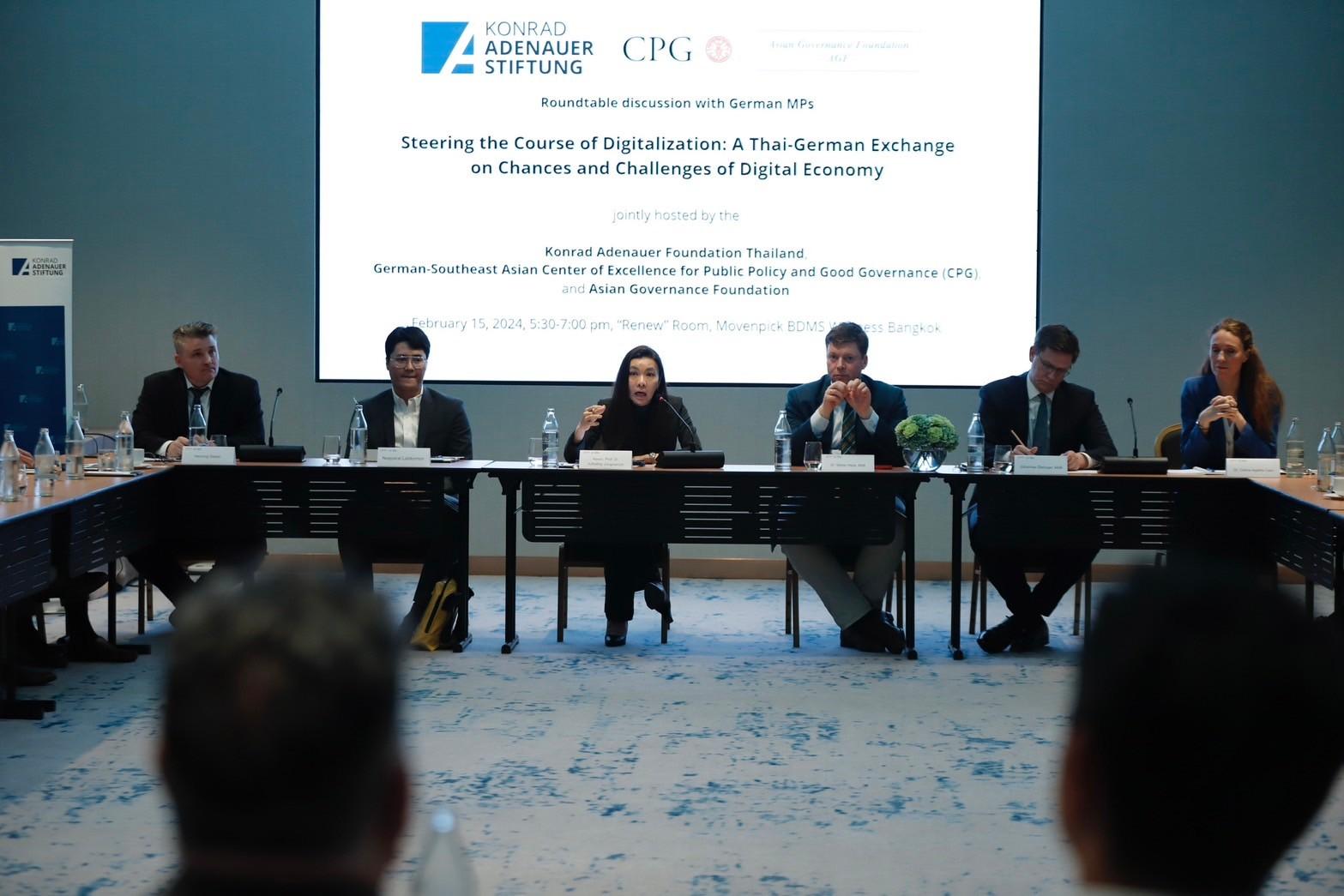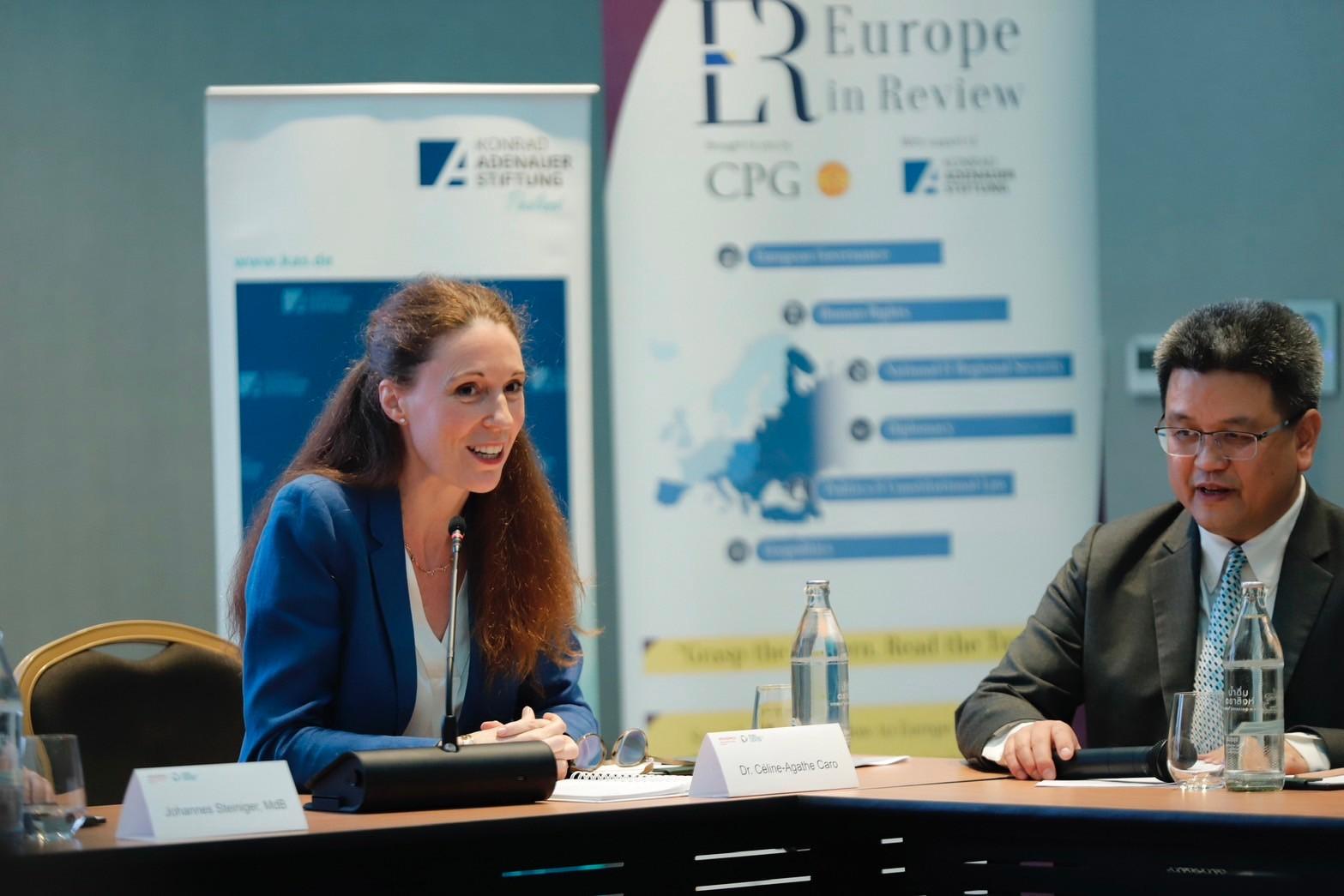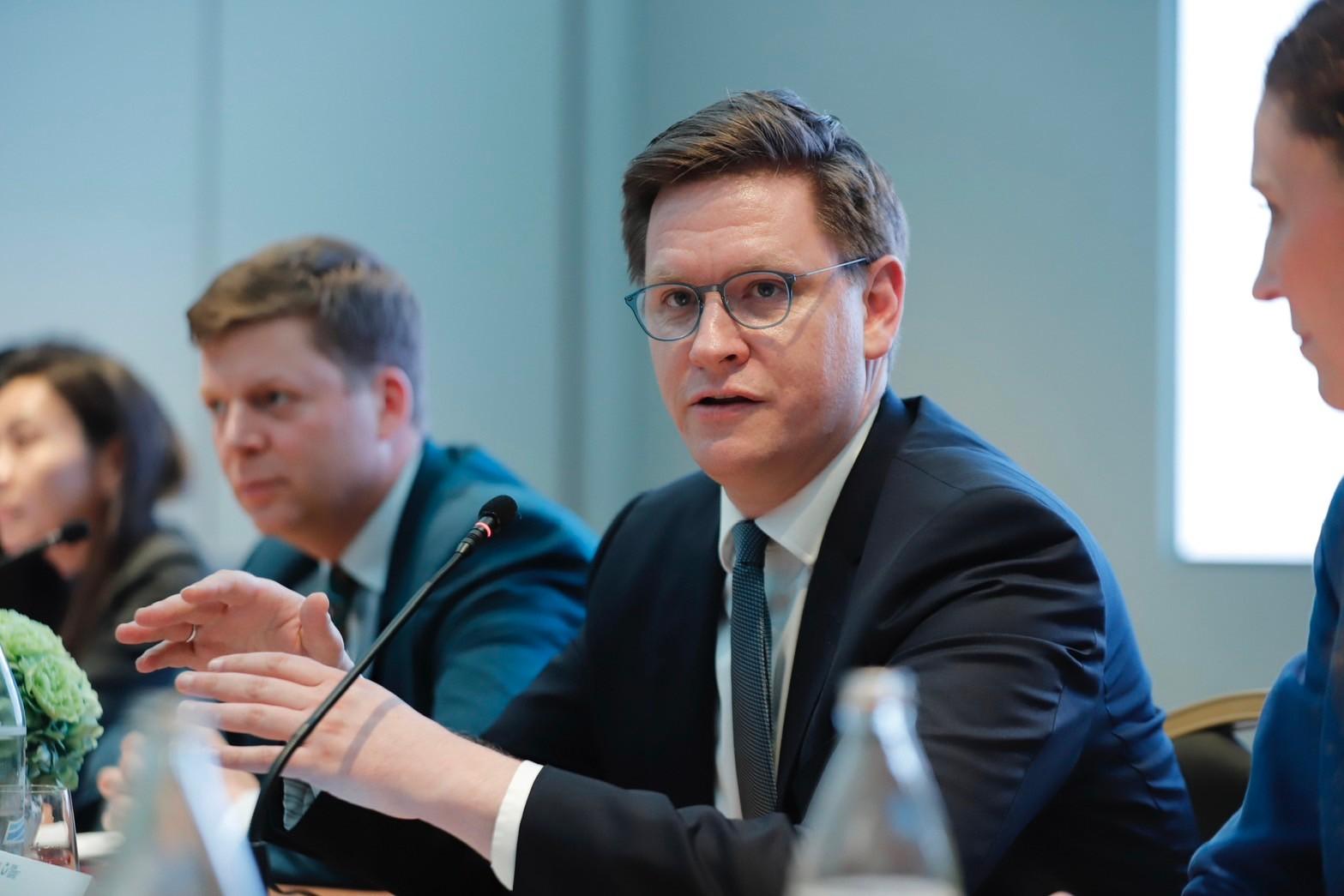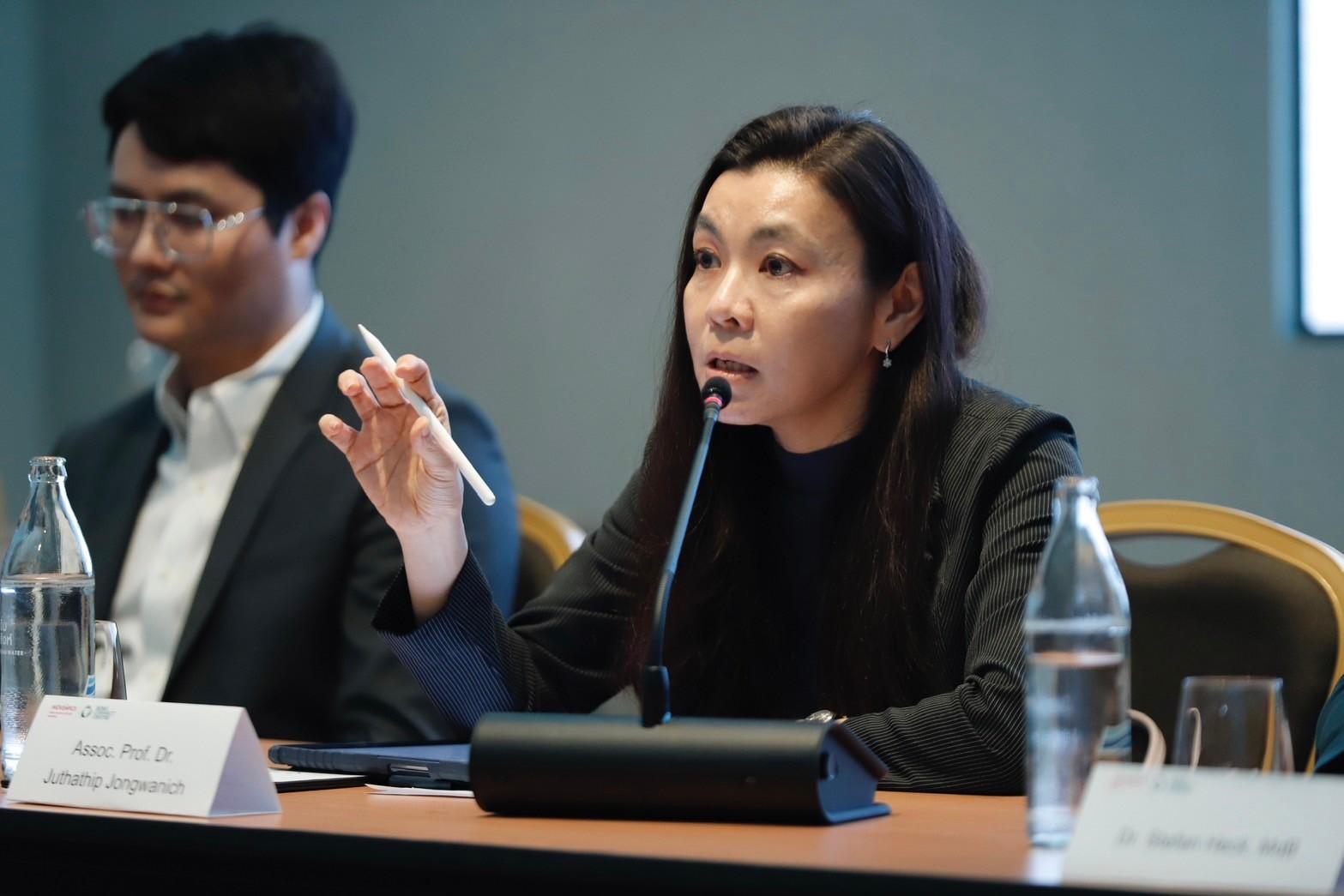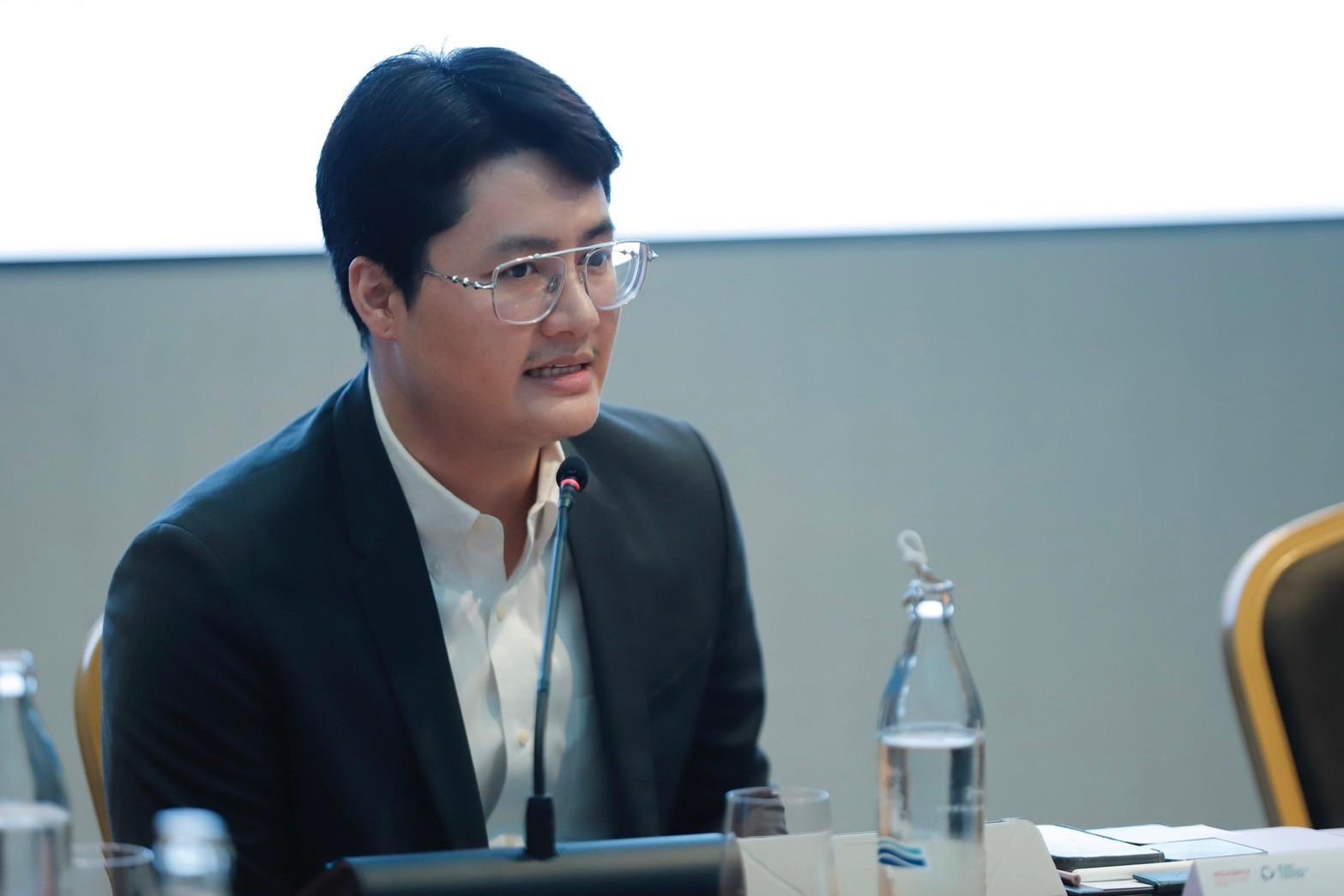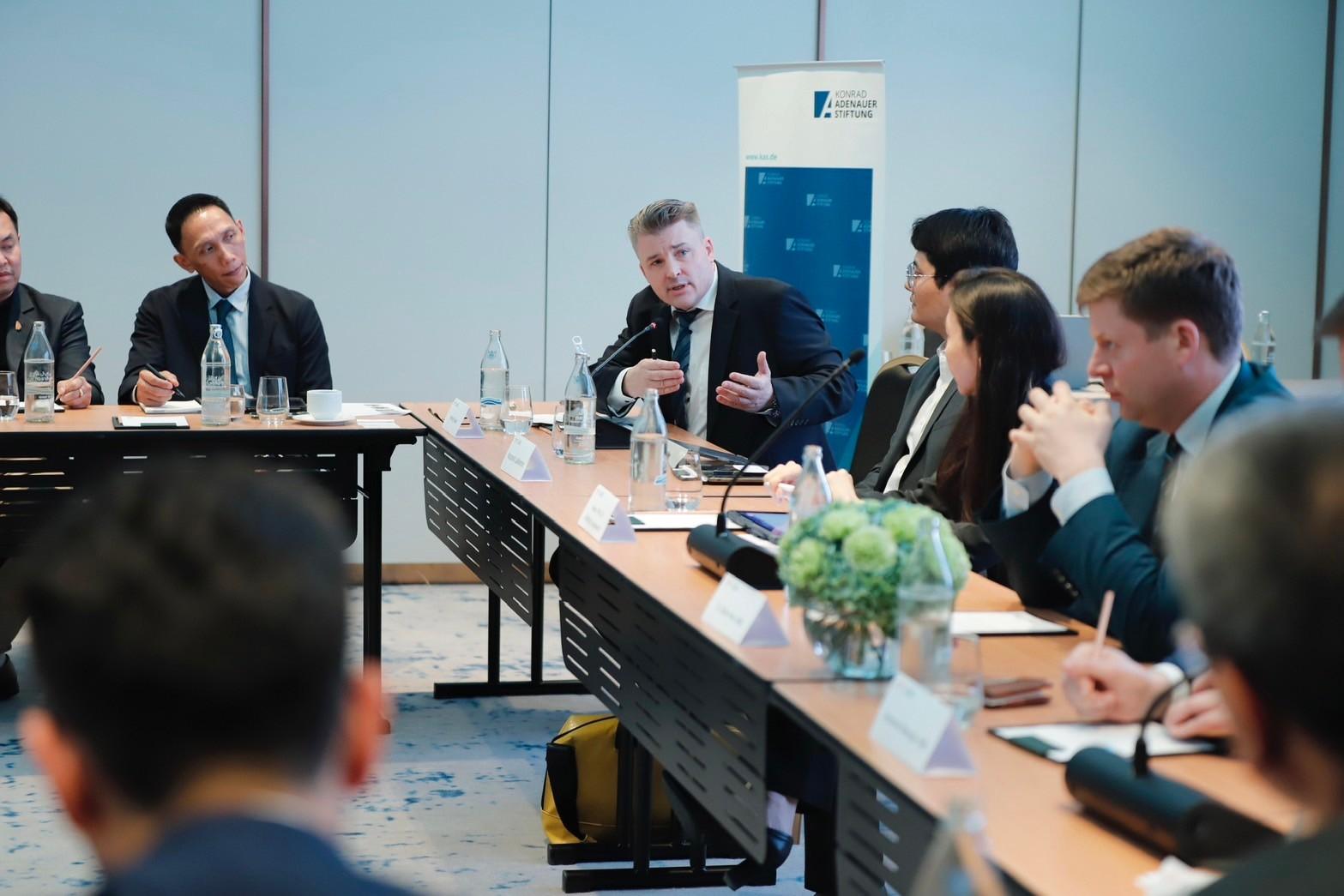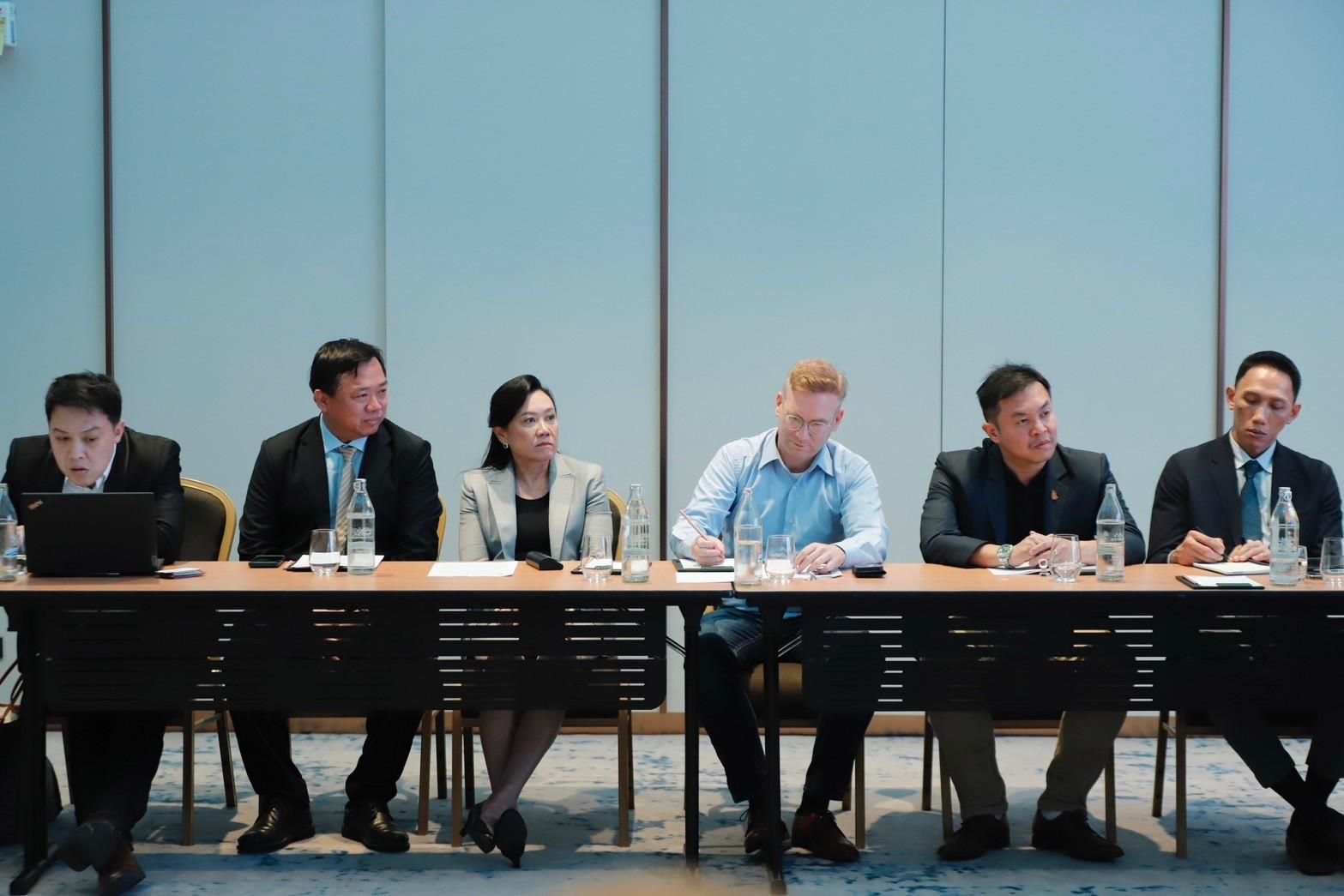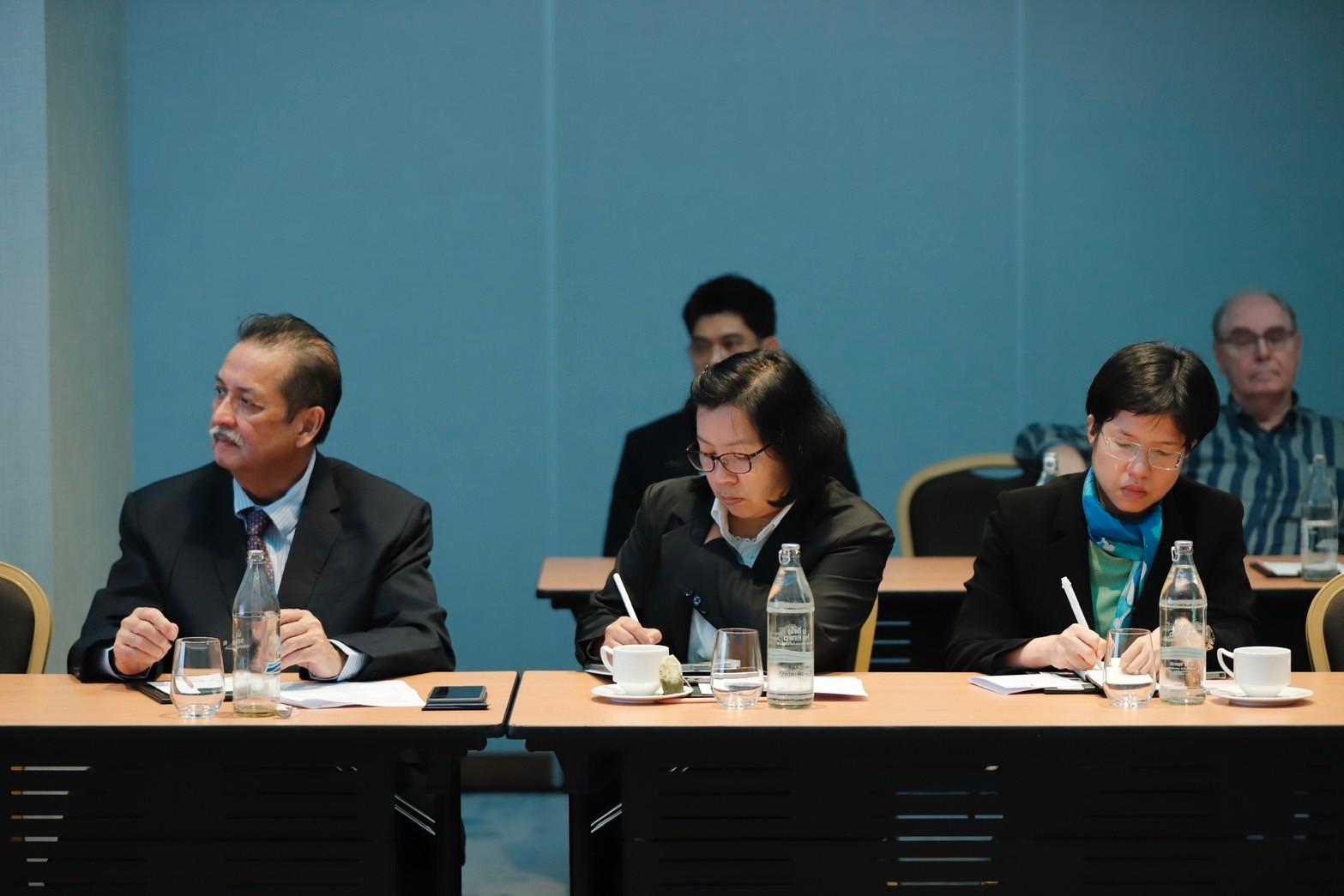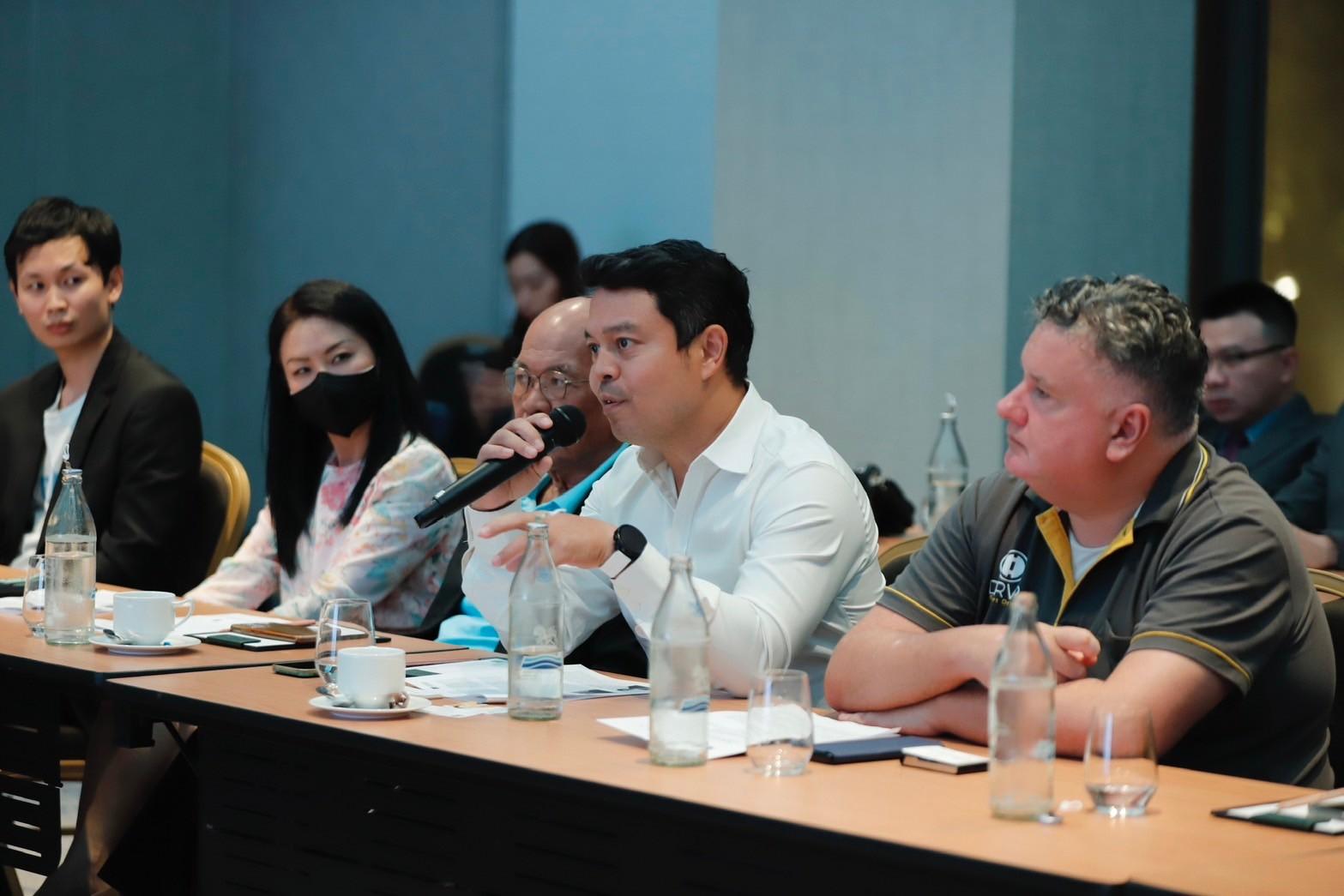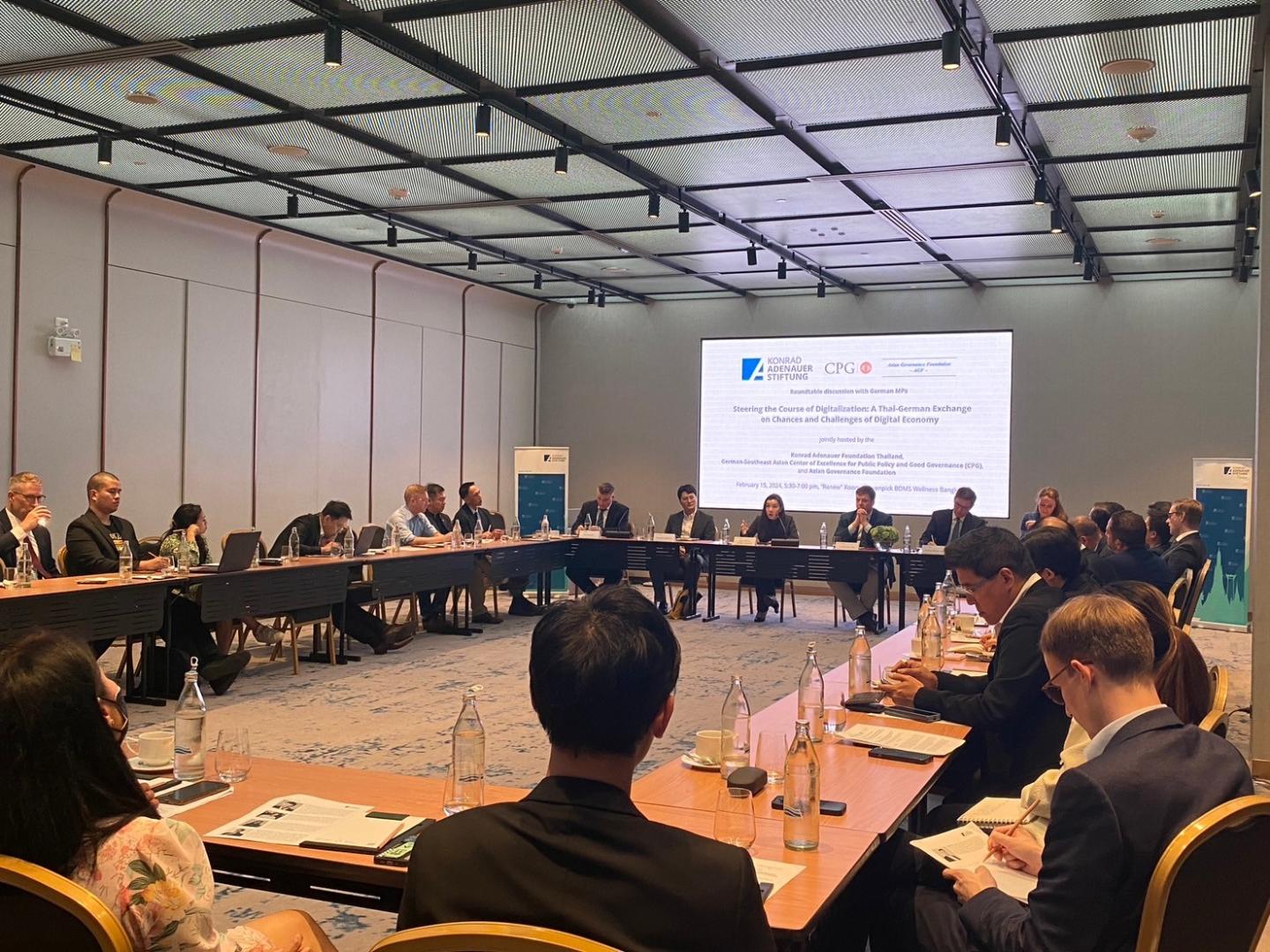The roundtable discussion featured insights from prominent speakers representing both Thai and German perspectives. The panelists included Dr. Stefan Heck and Mr. Johannes Steiniger, Members of the German Bundestag, Dr. Juthathip Jongwanich, Associate Professor at the Faculty of Economics of Thammasat University, and Mr. Nopparat Lalitkomon, data privacy and technology legal expert at law firm Tilleke & Gibbins. Participants in the audience hailed from various backgrounds such as international organizations, civil society, government agencies, academia, and especially the business community, thus signaling the broad appeal and relevance of this topic.
Mr. Henning Glaser, Director of the CPG and moderator of the event, opened the discussion by providing a number of questions serving as a guiding framework for the panelists. Dr. Juthathip Jongwanich commenced by highlighting the growth of Thailand's digital industry, which significantly outpaced the country’s overall economic development in recent years, with projections indicating further expansion. She attributed this growth primarily to investment, emphasizing its pivotal role as a driving force behind Thailand's digital transformation. Additionally, Dr. Juthathip underscored the notable improvements in digital infrastructure and accessibility in Thailand over the last decade. With nearly universal internet access and widespread 4G availability, the country has made substantial progress in enhancing overall accessibility, laying a strong foundation for digital innovation and economic growth. Moreover, she highlighted the Thai government's support for the digital economy, notably through initiatives like "Thailand 4.0" and the establishment of digital parks to nurture start-ups. Dr. Juthathip also expounded on amendments to investment policies aimed at attracting more investors as well as the government's financial support for the tech industry, including provisions for start-ups to raise funds directly from the stock market. However, she also alluded to the challenges facing Thailand's digitalization efforts, such as regulatory frameworks like the cybersecurity act and restrictive business guidelines, along with hurdles related to skilled labor shortages in the deep-tech sector and corresponding difficulties to attract sufficient investment in that area.
Subsequently, Mr. Nopparat Lalitkomon delved into the complex regulatory landscape governing digital operations in Thailand, particularly emphasizing its impact on businesses. He highlighted the stringent laws and regulations that foreign companies must navigate when entering Thailand, citing examples such as the Computer Crime Act. Additionally, Mr. Nopparat raised concerns about cybersecurity breaches in Thailand and the importance of adhering to regulations set by the Thailand Telecommunications Sector to address such breaches effectively. He emphasized the need for proactive measures and strict enforcement of existing regulations to mitigate cybersecurity risks. Furthermore, Mr. Nopparat stressed the importance of implementing security measures effectively, noting that cyber security is often hindered by lacking compliance on the individual level and that businesses and their employees need to adhere to security protocols and certain minimum standards.
Weighing in on this issue from the German perspective, Dr. Stefan Heck highlighted the importance of cybersecurity in the digital age, drawing from his experience in the internal affairs and homeland security committee in the German Bundestag. He emphasized the need for a comprehensive approach to address security concerns, particularly in light of highly controversial and pressing issues like Huawei's involvement in developing 5G networks and digital infrastructure in Germany and Europe. In this context he also noted the importance of having independent state-owned network operators, inter alia, to ensure reliable, rapid, and effective communication regarding disaster management and emergency response. Additionally, Dr. Heck discussed the complexities of Germany's fragmented data protection regime and regulations, advocating for streamlining the system to merge the federal and the various state-level agencies into one overarching national authority. Lastly, he touched upon the challenges in terms of digital administration where Germany still needs to improve.
Following up, Mr. Johannes Steiniger emphasized the growing significance of digitalization in global affairs, highlighting its transformative impact on almost all aspects of life. He underscored the need for secure and robust infrastructure, comprehensive education, and flexible legal frameworks to adapt to the ongoing digital revolution. Additionally, based on his position in the German Bundestag’s finance committee, Mr. Steiniger provided insights into policy initiatives in Germany aimed at embracing digitalization, including efforts to implement blockchain technology in finance and payment processes and to enhance cybersecurity regulations. He also addressed the challenges that digitalization potentially poses to democracy, particularly in the context of social media and AI's influence on public opinion. Moreover, Mr. Steiniger emphasized the importance of education in addressing disinformation and ensuring informed decision-making, especially among older demographics. He repeatedly highlighted the need for balanced policymaking that fosters innovation while simultaneously addressing regulatory concerns, particularly in the realm of AI regulation both in Germany and at the EU level.
Additional insights shared and questions raised
While underscoring the pandemic's role as a catalyst for accelerating digitalization and digital economy in Thailand, Dr. Juthathip once again cited the increased importance of skilled labor in driving further technological advancements and capitalizing on the developments in this sector. Such a high-skill labor force in the deep-tech field is urgently needed for example with respect to the potential of establishing Thailand as a new hub for semiconductor chip manufacturing. In response to queries from the audience, the panelists once again stressed the critical need for enhancing digital literacy among all segments of society, including government officials, to effectively navigate the digital landscape. The discussion further pivoted towards strategies for extending digital economy and services to rural areas, with both Dr. Heck and Mr. Steiniger emphasizing the importance of expanding digital infrastructure and internet accessibility as well as the significance of creating regulatory frameworks conducive to rural digitalization. Furthermore, the role of innovative technologies such as the Internet of Things (IoT), which will likely lead to greater connectivity in the future, was stressed unanimously by the panelists, along with the need to enable widespread access to and use of smart phones and similar devices. Touching upon the topic of combatting online scams, Mr. Nopparat elucidated the government's proactive measures in enforcing regulations and raising awareness to combat cybercrimes, highlighting ongoing efforts to educate the citizens and to streamline reporting mechanisms for digital security breaches.
Finally, the roundtable discussion concluded with a networking reception, providing attendees with an opportunity to further engage in dialogue and explore potential avenues for collaboration in steering the course of digitalization.
Overall, the event was very well received and served as a robust platform for deepening understanding and collaboration on digitalization between Thai and German stakeholders. The rich exchange of insights and perspectives underscored the transformative potential of digital technologies, while also highlighting the importance of proactive measures to address associated challenges.
Report provided by Tom Wilms, Independent Researcher
Report reviewed and finalized by Dr Céline-Agathe Caro
Topics
Provided by
Thailand OfficeAbout this series
The Konrad-Adenauer-Stiftung, its educational institutions, centres and foreign offices, offer several thousand events on various subjects each year. We provide up to date and exclusive reports on selected conferences, events and symposia at www.kas.de. In addition to a summary of the contents, you can also find additional material such as pictures, speeches, videos or audio clips.




